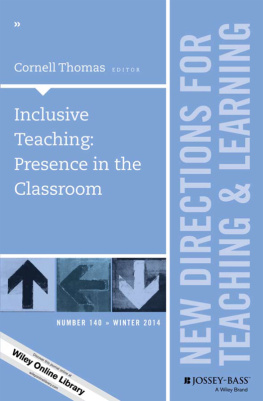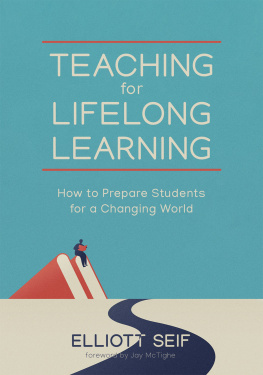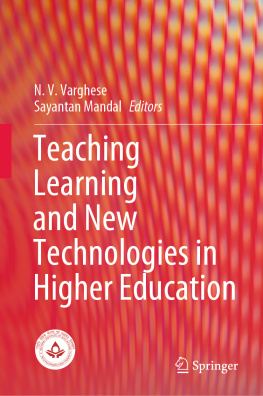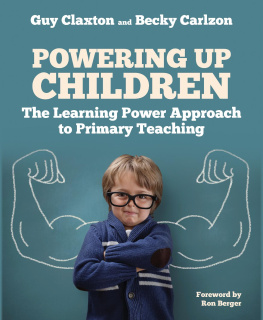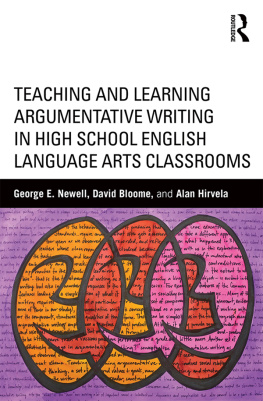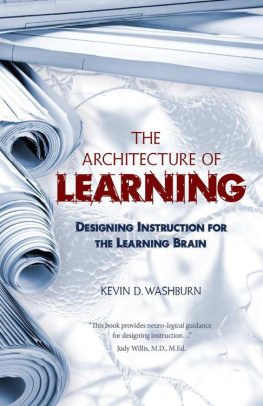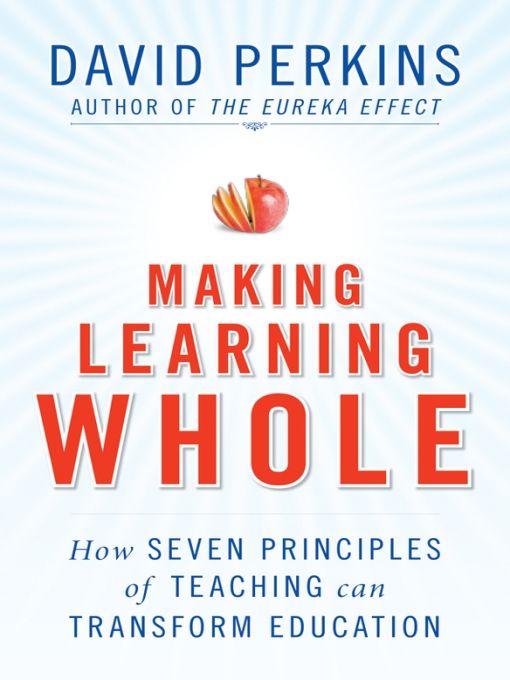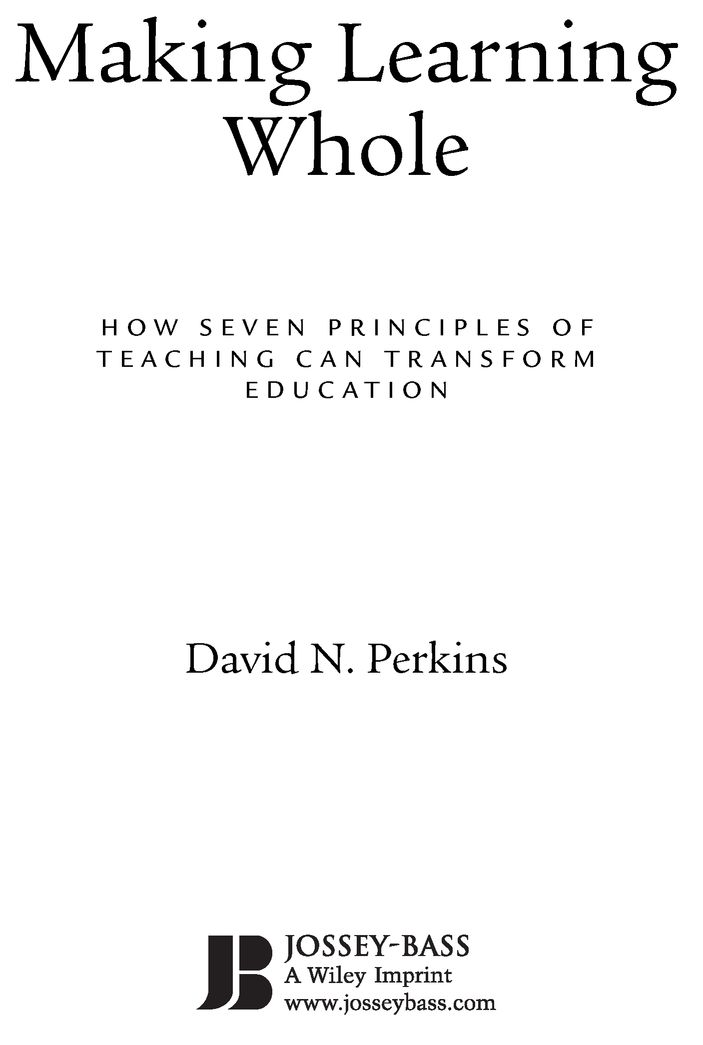Table of Contents
David Perkinss Making Learning Whole is a highly creative book that gives us ways of achieving moremuch morefrom our schools. The book presents a fascinating rethinking about how education might take placeand already does for the fortunate few with the most insightful teachers. Perkins teaches us that what those rare teachers do can be learned by new teachers and promoted by thoughtful principals. The result is a practical guide for thinking about how to make our schools exciting for teachers and students, and more productive than ever. This book ought to be read by everyone who is concerned about improving curriculum and instruction.
David C. Berliner, Regents Professor, Mary Lou Fulton College of Education, Arizona State University
Only David Perkins, the inimitable master of the metaphor, can so patently explicate practical steps to transforming education. This book is essential reading for educators at all levels.
Rod Rock, director of Instructional Services, Saginaw (Michigan) Intermediate School District
David Perkins goes straight to the heart of the matter. His seven principles of teaching vividly explain how to organize learning in ways that allow people to do important things with what they knowwhich is, after all, the point. Every educator should read this book, and so should policymakers whose work influences whether and how we can finally make school learning whole.
Linda Darling-Hammond, Charles E. Ducommun Professor of Education, Stanford University
David Perkins brings one of the most creative and energetic minds in education to generate a coherent whole from the seeming cacophony of proposals to fix our schools. He shows in this book how a potent metaphor can shape and order seven potent teaching/learning principles for everyday practice, in an engaging and often entertaining narrative that will be of enormous practical importance to teachers, administrators, policymakers, and college and university instructors.
Kieran Egan, faculty of Education, Simon Fraser University; Director, IERG (Imaginative Education Research Group)
A must-read for those serious about transforming education to prepare our youth for success in a rapidly changing world.
Dr. Jayne H. Mohr, Associate Superintendent, Traverse City (Michigan) Area Public Schools
If educators, education scholars, and students want to delve into a refreshingly clear, overarching, and bold treatment of school-based learning, this is the book they are likely to enjoy and greatly benefit from. David Perkins, the well-known Harvard innovative intellectual, summarized years of synthesizing observations, reflections, and the accumulation of serious research, cutting through the Gordian Knot of learning theories, to yield this very well-written book, filled with penetrating wisdoma must for all those interested in learning.
Gavriel Salomon, recipient of the Israel Award for Scientific Achievements in Educational Research, Haifa University, Israel
School administrators and policymakers need sturdy yet flexible ways to understand the complex and interdependent issues surrounding equitable learning. David Perkins provides such a framework through engaging metaphor and easily accessible prose. In Alameda County, weve benefited from his ideas for over five years in our work to engage the creativity of students, teachers, administrators, artists, families, and community members in making good on Americas promise of a high-quality education for every child.
We are fortunate to have found a scholar who speaks clearly and directly to practitioners about innovative theory and solid research. Such tools give us the support we need to develop and implement meaningful and relevant pedagogical strategies to grow the hearts and minds of the next generation of workers and citizens.
Sheila Jordan, superintendent, Alameda County Office of Education (California)
David Perkins is one of the great teachers of our time. In this insight-filled book, you can learn how he achieves his educational goals and how you can achieve yours as well.
Howard Gardner, Hobbs Professor of Cognition and Education, Harvard Graduate School of Education; author of Five Minds for the Future
To my father, who taught me how to play baseball and much more; and to my mother, who taught me how to be stoic and much more. I never achieved excellence in either one, but the lessons were important anyway.
ACKNOWLEDGMENTS
A familiar saying recommends turning a problem into an opportunity. I suppose this book is an example of that, because its origins reflect what has been a perennial problem for me. These pages come from my own struggles to share ideas about learning with students at my home institution as well as teachers, educational administrators, mentors, organizational leaders, and even occasionally parents in a variety of settings. As Ive pursued this mission over the years, Ive striven to tell the whole story in a clear way.
The challenge is not one of arctic sparsity but rain forest abundance. There are too many ideas about learning that merit attention, too many from practical experience and too many from the research literature, ideas about human motivation, mastering difficult concepts, acquiring broad literacies, learning in groups, self-regulated learning, developing problem-solving and decision-making skills, and on and on. Ive often felt frustrated about how to sort and bundle them into a coherent view that affords practical leverage. Until I sat down to write this book. The story told here certainly is not perfect, but I think at least its an improvement on my scattered notes.
A little bit of digital archaeology in my computer files revealed this books birthday: about four years ago. But for sure, the baby was not born walking and talking. First there was the basic notion of learning by wholes and the metaphor of playing the whole game, with a few other concepts bundled loosely around it. Gradually the metaphor of the game expanded to make the game worth playing, uncover the hidden game, and other principles, eventually seven in all. Opportunities to share the story in various settings helped to expand and refine it. With considerably more thought and callused typing fingers, the results are before you today. I hope that you find them useful.
All this required a great deal of help. Appreciation goes to Piero Buscaglia, my administrative assistant at the Harvard Graduate School of Education, who assisted with reference work and some syntheses of relevant research. Thanks also to Lisa Frontado, my administrative assistant before Piero, who made similar contributions to the earlier stages. My wife and my youngest son, Tom, were victims of my efforts to try out possible titles and phrases for key concepts, so thanks to them as well.
Appreciation is also due to many colleagues at the Harvard Graduate School of Education with whom Ive had conversations and collaborations over the years that feed into this volume, and to the sponsors of related research. Perhaps it is best here simply to recognize five principal lines of work. One is research on thinking and learning dispositions, where my principal colleagues over time have been Ron Ritchhart and Shari Tishman, with current sponsors Bialik College of Melbourne and the Abe and Vera Dorevitch Foundation, and earlier Peder Wallenberg and the Stiftelsen Carpe Vitam Foundation, and before that the MacArthur Foundation. Then there is research on teaching for understanding sponsored by the Spencer Foundation, with principal colleagues Howard Gardner, Vito Perrone, and Martha Stone Wiske. My principal colleagues for research on organizational learning and development have been Daniel Wilson and earlier Chris Unger, with current support by several corporate, nonprofit, and government affiliates and earlier by La Universidad de Bogot Jorge Tadeo Lozano. Research on causality and understanding science, which began as a collaboration between Tina Grotzer and myself, has been taken much further by Tina, all with support from the National Science Foundation. Finally, there is WIDE World, an initiative on widescale online teacher development, where my principal colleagues have been Martha Stone Wiske and David Zarowin, with invaluable support and counsel from Al and Kate Merck. I have learned from them all and from many others as well, and I have tried to identify specific contributions by appropriate references throughout the following pages.



